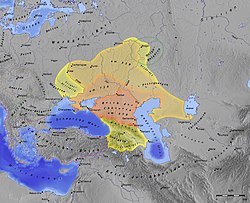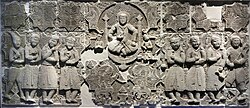 Global Information
Global InformationKhazars information
Khazar Khaganate | |||||||||||||||||||
|---|---|---|---|---|---|---|---|---|---|---|---|---|---|---|---|---|---|---|---|
| c. 650–969 | |||||||||||||||||||
 Khazar Khaganate, 650–850 | |||||||||||||||||||
| Status | Khaganate | ||||||||||||||||||
| Capital |
| ||||||||||||||||||
| Common languages |
| ||||||||||||||||||
| Religion |
| ||||||||||||||||||
| Qaghan | |||||||||||||||||||
• c. 650 | Irbis | ||||||||||||||||||
• 8th century | Bulan | ||||||||||||||||||
• 9th century | Obadiah | ||||||||||||||||||
• 9th century | Zachariah | ||||||||||||||||||
• 9th century | Manasseh | ||||||||||||||||||
• 9th century | Benjamin | ||||||||||||||||||
• 10th century | Aaron | ||||||||||||||||||
• 10th century | Joseph | ||||||||||||||||||
• 10th century | David | ||||||||||||||||||
• 11th century | Georgios | ||||||||||||||||||
| Historical era | Middle Ages | ||||||||||||||||||
• Established | c. 650 | ||||||||||||||||||
• Sviatoslav's sacking and razing of Atil | 969 | ||||||||||||||||||
| Area | |||||||||||||||||||
| 850 est.[4] | 3,000,000 km2 (1,200,000 sq mi) | ||||||||||||||||||
| 900 est.[5] | 1,000,000 km2 (390,000 sq mi) | ||||||||||||||||||
| Currency | Yarmaq | ||||||||||||||||||
| |||||||||||||||||||
| History of the Turkic peoples pre–14th century |
|---|
 |
| History of Tatarstan |
|---|
 |
|
The Khazars[a] (/ˈxɑːzɑːrz/) were a nomadic Turkic people that, in the late 6th-century CE, established a major commercial empire covering the southeastern section of modern European Russia, southern Ukraine, Crimea, and Kazakhstan.[10] They created what for its duration was the most powerful polity to emerge from the break-up of the Western Turkic Khaganate.[11] Astride a major artery of commerce between Eastern Europe and Southwestern Asia, Khazaria became one of the foremost trading empires of the early medieval world, commanding the western marches of the Silk Road and playing a key commercial role as a crossroad between China, the Middle East and Kievan Rus'.[12][13] For some three centuries (c. 650–965) the Khazars dominated the vast area extending from the Volga-Don steppes to the eastern Crimea and the northern Caucasus.[14]
Khazaria long served as a buffer state between the Byzantine Empire and both the nomads of the northern steppes and the Umayyad Caliphate and Abbasid Caliphate, after serving as the Byzantine Empire's proxy against the Sasanian Empire. The alliance was dropped around 900. Byzantium began to encourage the Alans to attack Khazaria and to weaken its hold on Crimea and the Caucasus and sought to obtain an entente with the rising Rus' power to the north, which it aspired to convert to Christianity.[15] Between 965 and 969, the Kievan Rus' ruler, Sviatoslav I of Kiev, as well as his allies, conquered the capital, Atil, and ended Khazaria's independence. The state became the autonomous entity of Rus' and then of Khazar former provinces (Khwarazm in which Khazars were known as Turks, just as Hungarians were known as Turks in Byzantium) in Volga Bulgaria.
Determining the origins and nature of the Khazars is closely bound with theories of their languages, but it is a matter of intricate difficulty since no indigenous records in the Khazar language survived, and the state was polyglot and polyethnic. The native religion of the Khazars is thought to have been Tengrism, like that of the North Caucasian Huns and other Turkic peoples.[16] The polyethnic populace of the Khazar Khaganate appears to have been a multiconfessional mosaic of pagan, Tengrist, Jewish, Christian and Muslim worshippers.[17] Some of the Khazars (namely the Kabars) joined the ancient Hungarians in the 9th century. The ruling elite of the Khazars was said by Judah Halevi and Abraham ibn Daud to have converted to Rabbinic Judaism in the 8th century,[18] but the scope of the conversion to Judaism within the Khazar Khanate remains uncertain.[19]
Where the Khazars dispersed after the fall of the Empire is subject to many conjectures. Proposals have been made regarding the possibility of a Khazar factor in the ethnogenesis of numerous peoples, such as the Hazaras, Hungarians, the Kazakhs, the Cossacks of the Don region and of Ukraine, the Muslim Kumyks, the Turkic-speaking Krymchaks and their Crimean neighbours the Crimean Karaites, the Moldavian Csángós, the Mountain Jews, even some Subbotniks (on the basis of their Ukrainian and Cossack origin and others).[20][21][22] The late 19th century saw the emergence of the theory that the core of today's Ashkenazi Jews are descended from a hypothetical Khazarian Jewish diaspora which migrated westward from modern-day Russia and Ukraine into modern-day France and Germany. Linguistic and genetic studies have not supported the theory of a Khazar connection to Ashkenazi Jewry. The theory still finds occasional support, but most scholars view it with considerable scepticism.[23][19] The theory is sometimes associated with antisemitism[24] and anti-Zionism.[25]
In Oghuz Turkic languages, the Caspian Sea is still named the "Khazar Sea", an enduring legacy of the medieval Khazar state.
- ^ a b c Golden 2006, p. 91.
- ^ Wexler 1996, p. 50.
- ^ Brook 2010, p. 107.
- ^ Turchin, Adams & Hall 2006, p. 222.
- ^ Taagepera 1997, p. 496.
- ^ Luttwak 2009, p. 152.
- ^ Meserve 2009, p. 294, n. 164.
- ^ Petrukhin 2007, p. 255.
- ^ Golden 2018, p. 294.
- ^ Encyclopedia Britannica: Khazar 2020.
- ^ Sneath 2007, p. 25.
- ^ Noonan 1999, p. 493.
- ^ Golden 2011a, p. 65.
- ^ Noonan 1999, p. 498.
- ^ Noonan 1999, pp. 499, 502–503.
- ^ Golden 2007a, p. 131.
- ^ Golden 2007a, p. 28.
- ^ Golden 2007a, p. 149.
- ^ a b Behar et al. 2013, pp. 859–900.
- ^ Kizilov 2009, p. 335.
- ^ Patai & Patai 1989, p. 73.
- ^ Wexler 1987, p. 70.
- ^ Wexler 2002, p. 536.
- ^ Davies 1992, p. 242.
- ^ Vogt 1975.
Cite error: There are <ref group=note> tags on this page, but the references will not show without a {{reflist|group=note}} template (see the help page).
Cite error: There are <ref group=lower-alpha> tags or {{efn}} templates on this page, but the references will not show without a {{reflist|group=lower-alpha}} template or {{notelist}} template (see the help page).